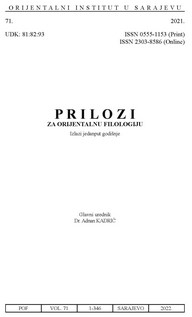TEKST KAO MJESTO SUSRETA UČENJAKA: PRAGMALINGVISTIČKA ANALIZA IDŽAZETNAMA IZ OSMANSKOG PERIODA
TEXT AS A MEETING POINT BETWEEN SCHOLARS: PRAGMALINGUISTIC ANALYSIS OF OTTOMAN ʼIĞĀZA MANUSCRIPTS
Author(s): Amra MulovićSubject(s): Cultural history, Phonetics / Phonology, Syntax, Pragmatics, Historical Linguistics, History of Education, 18th Century, The Ottoman Empire
Published by: Orijentalni Institut u Sarajevu
Keywords: ʼiğāza; speech act; expressives; directives; declarations;
Summary/Abstract: This paper deals with a pragmalinguistic analysis of five ʼiğāza manuscripts written in Arabic during the Ottoman period in the 18th century and one written at the beginning of the 20th century which were issued mostly to Bosnian scholars. ʼIğāza is a specific type of document and textual form common in the Islamic world. It confers upon a recipient the right to transmit a text, a specific knowledge he acquired, or to teach. This article investigates the performance of the speech acts in the corpus from the perspective of historical pragmatics within the framework of the speech act theory and the politeness theory. Since ʼiğāzas are extremely conventionalized texts, different types of speech acts, expressives, directives and declarations, the explicit and implicit form of their realization, as well as the principles of politeness, are viewed with regard to socio-historical contextual factors.
Journal: Prilozi za orijentalnu filologiju
- Issue Year: 2022
- Issue No: 71
- Page Range: 29-49
- Page Count: 21
- Language: Bosnian

